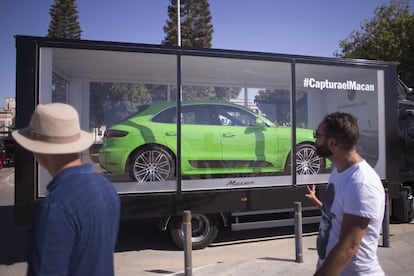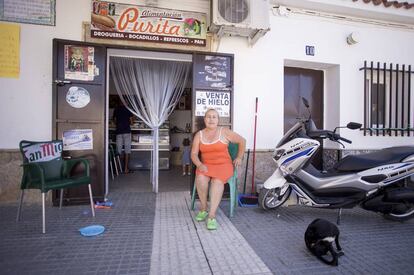A tale of two Spains
Glamor and poverty collide during horse racing carnival in Spanish town of Sanlúcar de Barrameda


“I don’t envy them one bit, sitting up there! They envy us, down here. This is Sanlúcar; that VIP area is for outsiders. That’s the way it is and we’re used to it,” says Carmen Roldán, a 57-year-old resident at the second day of the 172nd horse racing carnival at Bajo de Guía, a spectacular beach at the mouth of the Guadalquivir river in Sanlúcar de Barrameda, a small town some 25 kilometers from Cádiz on Spain’s southern Atlantic coast that is both the country’s second-poorest municipality, and the summer vacation residence of choice for many of Spain’s wealthiest families.
Sanlúcar de Barrameda has been hit hard by the crisis: Cádiz province suffers from long-standing structural unemployment and its cities and towns have some of the highest rates of joblessness in Spain. Official figures from 2014 show that the average annual household income is €17,222, compared to the €73,000 in the Madrid suburb of Pozuelo de Alarcón, the wealthiest town in Spain.

Sanlúcar has the second-highest unemployment rate in Spain: of its 67,620 inhabitants, 37.85% are without work.
But not everybody attending the horse races on the beach at Bajo de Guía this year believes the statistics. Mariano Ortega is watching the events from the VIP stand. He normally spends his summer vacation in Fuengirola, along the coast in Malaga province (and Spain’s third-poorest town), but likes the “classy” atmosphere in Sanlúcar. He admits that “there is astonishing inequality,” but also claims there is a “hidden economy” here.
I don’t envy them one bit, sitting up there! They envy us, down here. This is Sanlúcar; that VIP area is for outsiders Carmen Roldán, race attendee
Luis Ruiz, from Madrid, says he knows there is poverty in Sanlúcar, but prefers not to see it. Inés Loring, a painter with a summer home in the town, says she is aware of “social contrast” and tries to “deal with it as best as possible.”
The cost of admission to the races is €14, but this only gives access to the bookies and a number of temporary bars. The place to be at Sanlúcar, however, is up in the six VIP stands over the course of the week-long event. Here, the idea is to be seen rather than to watch the races.
Down on the beach, locals set up folding chairs and sunshades, children splash along the shoreline and vendors sell snacks. “We are simple people, we get by with what we have. My husband is unemployed, and at the age of 62, he’ll be picking grapes in a few weeks. The only money that we have is the €462 he gets from the state; my pension was stopped because it took us over the income limit. So that’s what feeds my husband and me, along with my daughter, who isn’t working, and my granddaughter,” says Roldán cheerfully.

In Sanlúcar, expensive restaurants and elegant 19th-century villas are dotted among run-down housing. “Inequality is everywhere, along with low levels of education and social status: there are still people here who address the wealthy as señorito [young sir]” says a painter who prefers not to reveal his name.
Rafael Amaya, aged 45, makes a living as a bouncer at a nightclub. “The majority of us are poor, but there is a lot of money here. Sanlúcar is for people with money.” And it is thanks to those wealthy people that he will earn around €60 for parking their cars each day during the races.
Sanlúcar has the second highest unemployment rate in Spain: of its 67,620 inhabitants, 37.85% are without work
The sun is setting on the second day of the races, and the attention of the VIPs up in the stands turns to the main event down on the beach. The riders are preparing, and the Civil Guard has cleared the area along the shore where the race will take place. Carmen Roldán is in the front row; the Doñana National Park makes a spectacular backdrop across the river. Looking up to the stands, Roldán says: “They’re just passing through. We live in paradise, the problem is what we have above us.”
English version by Nick Lyne.
Tu suscripción se está usando en otro dispositivo
¿Quieres añadir otro usuario a tu suscripción?
Si continúas leyendo en este dispositivo, no se podrá leer en el otro.
FlechaTu suscripción se está usando en otro dispositivo y solo puedes acceder a EL PAÍS desde un dispositivo a la vez.
Si quieres compartir tu cuenta, cambia tu suscripción a la modalidad Premium, así podrás añadir otro usuario. Cada uno accederá con su propia cuenta de email, lo que os permitirá personalizar vuestra experiencia en EL PAÍS.
¿Tienes una suscripción de empresa? Accede aquí para contratar más cuentas.
En el caso de no saber quién está usando tu cuenta, te recomendamos cambiar tu contraseña aquí.
Si decides continuar compartiendo tu cuenta, este mensaje se mostrará en tu dispositivo y en el de la otra persona que está usando tu cuenta de forma indefinida, afectando a tu experiencia de lectura. Puedes consultar aquí los términos y condiciones de la suscripción digital.








































